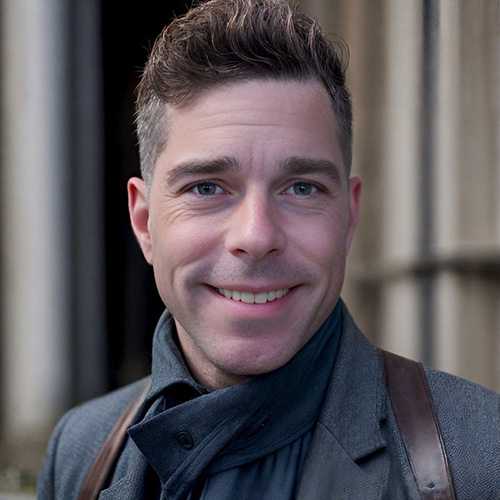Key details
Dr Eric Martin
Lecturer in Civil and Environmental Engineering
Dr Eric Martin is an Environmental Engineer and Lecturer at the University of Greenwich, where he leads the MSc Civil Engineering (Water, Waste and Environment) programme. His current research interests include data-driven hydrogeological characterisation of understudied areas, emerging contaminants, as well as the application of image analysis, time series modelling, and machine learning to environmental data. He has collaborated with the Alan Turing Institute and the British Geological Survey on applied data science projects in geohazards and carbon storage.
After completing his PhD at Queen’s University in Canada, he advised the Ontario Ministry of the Environment as a Hydrogeologist while lecturing at Queen’s University on Environmental Chemistry, Numerical Methods, and Professional Skills. He later joined the University of Birmingham’s MSc Hydrogeology programme, teaching advanced modules in groundwater hydraulics, contaminant transport, and organic pollutant remediation, alongside practical field instruction. Outside of academia, he spent seven years in regulatory hydrogeology, leading groundwater assessments and environmental reviews for industrial, agricultural, and northern infrastructure projects, often working closely with Indigenous and government partners.
Responsibilities within the university
- Lecturer in Civil and Environmental Engineering
- Programme Lead: MSc Water, Waste and Environment
- Module Lead: Contaminant Hydrogeology & Contaminant Remediation, Hydrosystems
- Module Contributor: Environment and Earth Materials, Engineering Professional Skills, Introduction to Solid and Fluid Mechanics, Information Technologies for Environmental Engineering
- External Assessor - Taighde Éireann – Research Ireland
- External End Point Assessor - Digital and technology solutions Apprenticeship.
Recognition
P.Eng., Professional Engineers Ontario.
Research / Scholarly interests
Groundwater makes up over 97% of the world’s available freshwater, yet it remains under threat from climate change, emerging contaminants, industrial agriculture, and unsustainable extraction. Today, more than 700 million people face water scarcity across 43 countries—a number the United Nations projects will rise to between 1.7 and 2.4 billion by 2050. Groundwater sits not only at the heart of global water security, but also at the intersection of energy and environmental resilience.
Dr Martin’s research addresses these intersecting challenges through the study of groundwater systems, contaminant transport, and engineered responses. His work combines experimental, numerical, and data-driven methods, with current projects involving time-series analysis of satellite data and image segmentation for pore-scale fluid characterisation. He has also collaborated with the British Geological Survey and the Alan Turing Institute on machine learning applications in environmental geoscience, including geohazard detection and carbon storage assessment.
His broader aim is to improve groundwater monitoring and management through integrated physical and data systems, particularly in understudied or data-scarce regions. He is especially interested in approaches that couple hydrogeological characterisation with risk-informed environmental management and support scalable, adaptive solutions to 21st-century resource pressures.
Recent publications
(In press) Leeming, K., Martin, E.J., Alfaro, J., Akintola, M., Japnanto, J., Patsiukova, J., Wang, L., Shiranirad, M., Organokov, M., Tohme, R. and Lu, Z. Data Study Group Final Report : British Geological Survey - Detecting Shallow Gas from Subsurface Seismic Images. The Alan Turing Institute.
Leeming, K., Martin, E.J., Frayling, L., Baker, S., Tsiakmakis, D., Hazaridis, N., Dalton, D. and Kadochnikova, A. (2025). Data Study Group Final Report : British Geological Survey - Identifying Potential for Carbon Capture and Storage in Rock. The Alan Turing Institute. Available at : https://doi.org/10.5281/zenodo.14973572 [Accessed 17 Apr. 2025].
Mumford, K.G., Martin, E.J. and Kueper, B.H. (2021). Removal of trichloroethene from thin clay lenses by electrical resistance heating. Journal of Contaminant Hydrology, 243, p.103892.
Martin, E. J., Mumford, K. G., & Kueper, B. H. (2018). Removal of TCE From Clay Lenses by Multi-Phase Diffusion During Electrical Resistance Heating. Proceedings of the 4th World Congress on New Technologies (NewTech’18).
Martin, E. J. (2017). Gas Production and Mass Transfer During the Electrical Resistance Heating of Clay Lenses. Doctoral dissertation.
Martin, E.J., Mumford, K.G., Kueper, B.H. and Siemens, G.A., (2017). Gas formation in sand and clay during electrical resistance heating. International Journal of Heat and Mass Transfer, 110:855-862.
Martin, E. J., & Kueper, B. H. (2011). Observation of trapped gas during electrical resistance heating of trichloroethylene under passive venting conditions. Journal of contaminant hydrology, 126(3): 291-300.
Martin, E. J. (2009). Laboratory study evaluating electrical resistance heating of pooled trichloroethylene. Master’s dissertation.
Presentations
Removal of TCE From Clay Lenses by Multi-Phase Diffusion During Electrical Resistance Heating. Presented at The 8th International Conference on Environmental Pollution and Remediation (ICEPR'18), part of the 4th World Congression New Technologies (NewTech’18). August 21, 2018, Madrid, Spain [Conference Talk]
Martin, E.M., K.G. Mumford, B.H. Kueper (2017), Removal of TCE From Low Permeability Clay Lenses by Multi-Phase Diffusion During Electrical Resistance Heating. International In-Situ Thermal Treatment Symposium, Banff, Alberta, Canada. [Poster Presentation].
[Workshop / Symposium] Martin, E., (2015), Electrical Resistance Heating in Sand and Clay. Thermal Remediation Workshop. Queen’s University, Kingston, Ontario, Canada.
[Workshop / Symposium] Martin, E., (2013). Electrode design and corrosion control for bench-Scale Experimental Testing of Electrical Resistance Heating. Thermal Remediation Workshop. Queen’s University, Kingston, Ontario, Canada
[Conference Talk] Martin, E.J. and Kueper, B.H. (2011). Observation of trapped gas during electrical resistance heating of trichloroethylene under passive venting conditions. Geological Society of America Annual Meeting & Exposition. Minneapolis, Minnesota, U.S.A
